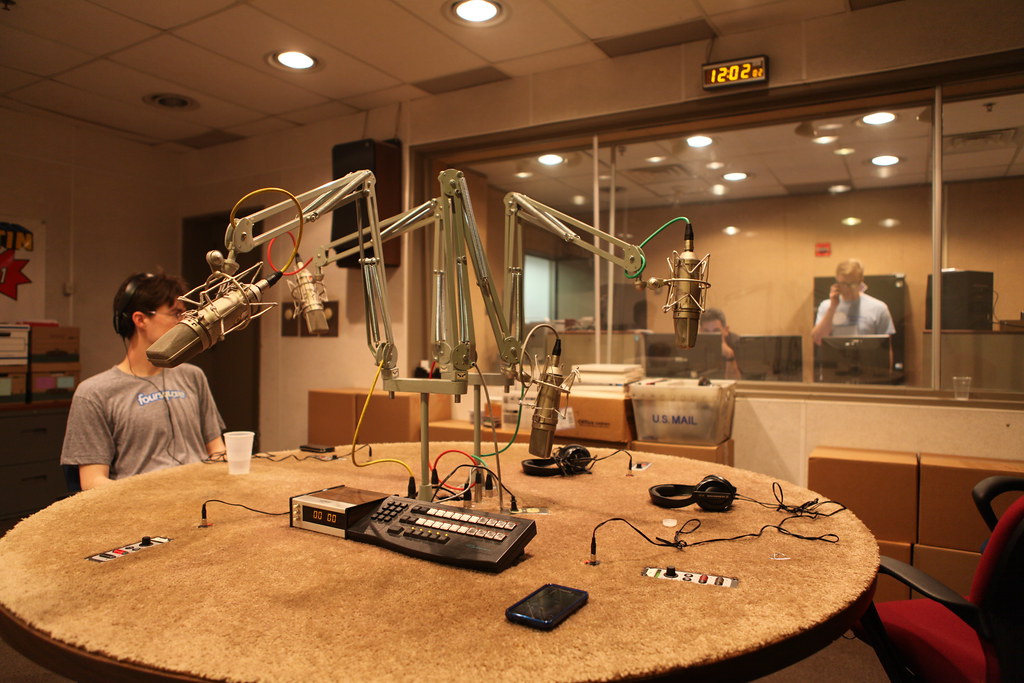On the On the Media —
BROOKE GLADSTONE: This is On the Media. I’m Brooke Gladstone.
BOB GARFIELD: And I’m Bob Garfield. Once we put photos in a scrapbook. Today we put them on Flickr. Once we chronicled our days in a diary. Now we update our Facebook page. Once we kept Super 8 movies of our kids. These days we post videos on YouTube. Once upon a time, we also put things on GeoCities and Friendster and Google Video. But now – they’re long gone.
Well, Jason Scott operates on the premise that every repository of user-generated content online will one day die but that the content we put there is worth saving. He leads an ad hoc group of archivists called the Archive Team, who swoop in to salvage material when a site is closing. Still, he wishes the users would render his service obsolete. And so, he urges everyone who begins to post to prepare for the end.
JASON SCOTT: Anytime you want to join up with anything, any kind of service that lets you do things for free, the first question is, where is your export function, where can I grab a copy from your site of the material? If they say, we’re working on it, then they’re lying to you. It should be as easy for them to do that as anything else. So if they do have an export function, use it. People put their lives online and then one day wake up and realize it’s not there anymore. They are keeping their memories on spinning magnetic pieces of metal.
BOB GARFIELD: That somebody else owns.
JASON SCOTT: Yes.
BOB GARFIELD: Set the scene for me. You get the notice of some service that is on its way out, what do you do?
JASON SCOTT: It’s helpful to understand that there’s a whole bunch of services out there, where you might have millions of accounts – things like GeoCities, Friendster, you know, even places like Foursquare and Flickr, where people have been encouraged to, for free, upload things they made or are doing, and then at some point someone moves a check mark from column A to column B, and they decide, eh, after this next financial quarter I think we’ll be taking this down. And the amount of time they give you is – basically random.
I’ve seen everything from six months to 48 hours. And all these people who may not have even thought about this site for – years suddenly are having it taken away. They might not be alive, they may not know how to get to their old account. They may not be checking that email.
And so, what we did was come up with this idea of the Archive Team, a collection of archivists, developers, and we would do our best to take one snapshot of the place, put it into an archive and give people the option of getting some of their data back.
BOB GARFIELD: Give me some example. What sites have you rushed in to salvage what is stored there?
JASON SCOTT: There were a couple of sites that did podcasts – Podango, MyPodcast. And what would happen is, is they would literally give you four or five days to get off – thousands of shows, thousands of episodes. So we go in and we’ve pulled down hundreds and hundreds of shows and thousands of episodes.
Poetry.com, that was a company where people were basically making their poems available, and it had about 14 million written poems. And the company basically announced, we’re shutting down, we’re going to give you about a month, hope you enjoyed your time [LAUGHS] with your poetry. So we went in and we started downloading it, and what we discovered, to our great surprise, was they started blocking us from downloading the poetry.
BOB GARFIELD: What was the relationship between you and the authors at the time? Did they express frustration that they couldn’t get at their stuff?
JASON SCOTT: One of the things that always breaks our heart is that one of these companies will announce they’re shutting down, and they’ll put it into a blog post – “Goodbye, it’s been great,” and then all the comments will be, “Please help me, how do I save this? I can’t find my husband’s password, he died two years ago.” You know, we get compared to firemen. You’d go in and you try to grab what you can.
So we grabbed the most popular poems, based on their viewer counts, and then we tried to sequentially go through and get as many poems as we could.
BOB GARFIELD: Well, there’s a little vigilantism you’re describing here. Tell me about the legality?
JASON SCOTT: Oh man, you know, the thing is we all know that this country is a little psychotic about copyright, right? I mean, just a little bit. We’re not selling what we’re putting here. We’re not putting ads on it and putting it back up again. We’re definitely not giving it to other businesses and selling it to them, you know?
Some of these things have no commercial value whatsoever, some of them might have commercial value, but the fact is, is that we are literally being that guy that hopefully in 20 years, 50 years someone goes, “Oh, thank goodness they were here at that point.”
Sites that block us are extremely rare because we find these companies have actually given up not just watching them but even caring about them.
BOB GARFIELD: Now, much of what anyone posts is trivial, and if it gets lost, who cares. Is most of what you bring back just kind of, I don’t know, junk?
JASON SCOTT: You know, the example that I give is a Civil War letter to a wife from her husband who was on the front lines. It might be the most trivial thing just saying, hope the cows are okay, hope you’re fine, but there’s so much other information coded in there.
There could be a water mark showing that a company that said it never worked for that side did, in fact, sell paper to that side. It could be a certain kind of ink. It could be that that one front guy became a general, and this is one of the few cases of him signing his own name.
I know it’s a stretch but there are people right now taking some of the things we download and doing cultural analysis: “This is what happens when life went online, this is what happened when people reached a larger audience than their genetic line had ever reached. What did they do, given that power?”
And so, even though we might objectively say this is trivial, I wouldn’t want these read out to me one by one forever, everything historical that we see is because a whole line of people said, “Let’s now throw out that box, let’s not delete that tape, let’s not get rid of those pictures.” And I don’t want to be the guy who decided, okay, this is good, this is bad and then a hundred years later be hated.
BOB GARFIELD: Jason, thank you very much.
JASON SCOTT: Thank you.
BOB GARFIELD: Jason Scott leads the Archive Team.
♦
So, we can leave the interview at that, but I won’t. If you want to read on, that’s your choice.
As a semi-professional attention getter, I end up being interviewed a lot, especially when some hot new thing is attached to me. In the current realm, that hot new thing is Archive Team. It’s got what the hungry news producer wants: a humanity-endearing goal (preserve), a bad guy (everyone who is deleting user data for money reasons), and a guy who’s up for being really loud and really intense (me). There’s a lot more to Archive Team than just me, of course, but as it is I am sucked into studios for discussing this whole mess quite frequently.
I was interviewed by the BBC for a show called “Click!“, the results of which are available, to some extent, at this link. To do this, the BBC rented space near where I was in San Francisco that week – they actually used a studio called KQED. Here’s some shots from that:
In this particular case, the engineer was a little off the ball, dragging on with the previous setup so that the rented time that the BBC had was cut by a half-hour. We got on track pretty quickly, and my two hosts were very talented at bringing the whole thing a sort of growly-sexy “now, we’re all having a bit of a fun, but what of the deeper meaning” vibe that I only really see in English programs. I was coy about the names of companies Archive Team was targeting that week, mostly because I didn’t want it to filter into boardrooms and cause a panic mode, but the BBC guys sussed out which companies I was talking about anyway, so kudos for doing a little legwork. As you can see from the photos, you sit at a desk and have a huge microphone, as well as seats for other guests and speakers with everyone looking at you. KQED is a hell of a nice studio, and it was a pleasure to be in there.
Perhaps it’s a little jarring that you don’t see your hosts, and will never see them, but the people involved tend to be professionals and end up making it like the greatest-sounding phone call of your life. It’s a fun gig and I will happily continue to do them.
So contact came in from a producer of the NPR show “On the Media” to discuss Archive Team, and it’s obvious they wanted it because of a relatively recent magazine writeup, as well as wanting it right away. After some back and forth discussion, I ended up on the phone with the producer for a “pre-interview”, which a person used to podcasts might not have experienced – basically, the producer conducts almost an entire actual interview to determine whether or not you’re retarded. If you’re not retarded, you get to go on to an actual interview with the host, at some point down the line. Most shows can’t afford to rent a studio, much less throw a human being at you to spend an hour interviewing, but when they do this, it generally means you’re dealing with a top tier organization.
As I said before, I get pulled into Archive Team representation a lot right now, but for the past half-dozen years or so, I’ve actually been on a secondary mission/goal – to spread and share as much of my life outlook and learned lessons to as many people who are prepared to receive it. To that end, I’ve tried to share with other like-minded compatriots whatever it is possible to share, so that my ideas and the things I care about outlive and outreach me. It’s a nice goal.
And that’s why I was in a studio in Austin, Texas, during the South by Southwest Festival, to speak about Archive Team with the NPR “On the Media” show. And why I brought along Astrid, one of the Archive Team members who happened to also be at South by Southwest. Here’s what the studio we were at for it looked like:
I was trying to show Astrid how the pros work, so she could learn how to react quickly to whiplash questions and clarification requests from one of the bigger names. Unfortunately, it didn’t work out that way.
After the 20 minute delay getting started while we cooled our heels (and by the way, the engineer for our session, David Alvarez in the window there, was pro beyond pro and a pleasure to work with), we were finally connected with my interviewer.
I should have sussed out what the next 35 minutes were going to be like when the VERY FIRST part of the conversation went this way:
JASON: Hi, how are you doing?
BOB: (Pause) I’ll be a lot better later.
What followed was a stumbling, barely coherent host jumping all over the place, and peppering questions of all variant quality, interspersed with commands to his engineer/producer, the kinds of things you generally want to say POST interview. Not here.
I think the best moment, however, and one which thankfully didn’t make it to the final cut, was when we were discussing Archive Team’s proactive methods, Bob told the story of OJ being arrested for threatening someone at gunpoint over his own property and going to jail for years, and asked how we’re different. Nice one.
Anyway, I was mostly sad after all this because I could see how disappointed Astrid was. I’m not saying they made Astrid cry, but what a better use of our time if we’d been in the place of greatness. We were not.
Is the final work a nice one? Yes, someone in the On the Media organization edited the hell out of that thing. Does that mean I should shut up and take it? Nah. I’m telling you how it went down in the event that someone else gets Bob on the wrong side of the bed one morning and thinks it was them or their fault. It wasn’t.
If I have to give one piece of advice I’ve learned over the years of dealing with news media of all stripe, it’s that you get all kinds. The ones who respect you and make the audience informed about your subject while adding their own insight – those jewels should be given your respect and time. (Kim Zetter, call me, we’ll do lunch.) But if you find yourself on the ass end of a paddling for nothing other than a lazy or distracted or resentful scribe, hang up or resolve never to deal with them again, if you don’t realize it until it’s too late. Trust me, there’ll be others.
Hey, I warned you about reading further!
Categorised as: jason his own self | punditry | Uncategorized
Comments are disabled on this post



That’s rather specific – are these real examples?
It’s rather specific just because the benefits of history as a tangential indicator of items far beyond the physical object’s are a hard idea to get across. There’s no specific example of what I give there, although here’s a discussion of a watermark, here’s a document with the only verified signature of Betsy Ross, and here’s an essay on evaluating ink.
Great interview! But I just had to bitch and moan. Couldn’t (at least easily) find a direct download link, and I had to struggle to find out what to use to stream. So, I’m loving an it and listening to it, but my archive of mp3’s of Jason Scott will be lacking.
For everyone else, it’s in the m3u file. The mp3 file is here.
Great interview btw! Must have a listen to that BBC interview too.
Listening to NPR today and this story made me recall Jason mentioning the Civil War analogy.
As a photo of an unknown soldier from a private collection is used to identify him:
http://www.npr.org/2012/04/11/150288978/unknown-no-more-identifying-a-civil-war-soldier
Just in case someone can’t play the BBC flash stream thingy for the Click interview, I’ve put an mp3 of it up at http://www.spildprodukt.dk/stuff/